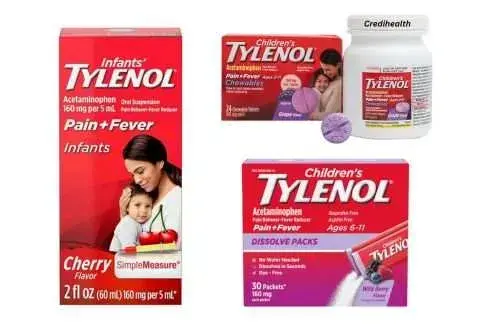As a parent, it can be challenging to know how much medication to give your baby, especially regarding pain relief. Infants' dose of Tylenol is based on their weight, and it's essential to follow the recommended dosage instructions carefully to ensure the safety and effectiveness of the medication. Also, It is important to follow the recommended tylenol dosage for infants based on weight to ensure the safe and effective use of the medication. In this post, I will provide essential information on how much Tylenol should give your infant and other factors to consider before administering medication.
What is Tylenol (Acetaminophen)?
Tylenol is an analgesic (pain relief and fever-reducing medicine.) It is mostly used to reduce fever and minimal pain caused by conditions such as the flu, a cold, muscle aches, arthritis, menstrual cramps, headache, toothache, et cetera.
It has the same chemical composition as Paracetamol and is known as Acetaminophen in the United States and Japan. Tylenol, Paracetamol, Crocin, Mapap, Panadol, and Dolo- are all several available brand names for the same medical composition.
Also Read: 5 Best Period Cramps Home Remedy
Types of Tylenol (Acetaminophen)

Types of (Acetaminophen) Tylenol dosage for infants are available in the market:
- Childrens and Infants Tylenol Liquid
- Childrens Tylenol Dissolve Powder Packs
- Childrens Tylenol Chewables
How To Use (Acetaminophen) Tylenol Dosage For Infants?
This product is taken orally, as directed by your physicist or pharmacist. There are directions provided on the box as well. As mentioned, there are many brands and forms of Acetaminophen available. The amount of Acetaminophen may differ between several brands' products; therefore, it is important to read the instructions carefully. It is advised not to consume more Tylenol than recommended.
1. Childrens Tylenol Dissolve Powder Packs
If children's Tylenol dissolve powder packs are given to a child under pediatric care, one must use the product meant for children. The right dosage of the product depends upon the child's weight. The guide to weight and amount of medicine is usually provided on the product package. If the recent weight of the child is not known, it is advised to use their age.
2. Childrens Tylenol Liquid
There may be suspensions if the medicine is taken in liquid form. Thus it is advised to shake the medication well before each dosage. Some liquids do not need to be shaken before use. Again, this depends on the brand of the product. Thus it is always recommended to read the instructions provided on the product packaging.
The liquid medication is to be measured with the dose-measuring spoon/dropper/syringe that may be provided with the product. This is to ensure that you have the correct dose. The usage of a household spoon is strictly recommended. For rapidly-dissolving types of medication, you may chew the medicine or allow it to dissolve on the tongue and then swallow it without using water.
3. Childrens Tylenol Chewables
The medicine is also available as chewable tablets. In this case, chew thoroughly before swallowing. It is strictly advised not to chew extended-release tablets. Doing so against advice can release all the drugs simultaneously, which may significantly increase the risk of side effects. It is, therefore, recommended that the tablets be swallowed whole.
Another variation in which this medication is available is as effervescent tablets. In that case, you should dissolve the recommended or prescribed dosage in the amount of recommended water, then drink. If you have any queries about "Can you take Aspirin and Tylenol together"?
What Precautions Are To Be Taken Before Taking Tylenol?
Before taking Tylenol, notify your healthcare professional or your pharmacist of any allergies you might have. The product might contain inactive reagents that cause allergic reactions or induce underlying allergies.
Be sure to notify your healthcare professional of your medical history, especially of liver disease or regular use/abuse of alcohol. Your healthcare professional is the person you should talk to about your proud and shameful history so that they can extend any help within their capacity.
Liquid products, chewable tablets, or dissolving/effervescent tablets might contain powdered sugar or aspartame. It is advised you maintain caution if you have diabetes, PKU (Phenylketonuria), or any other disease that may require you to limit or avoid these substances in your regular diet.
Also Read:Is Tylenol a blood thinner? Know 8 side effects
What Are The Possible Side Effects of Tylenol?
Tylenol Acetaminophen or Paracetamol is usually a safe drug. This drug usually does not have any side effects. However, it is recommended to look at the warning section, where the side effects and other warnings may be listed. If any unusual effects are observed, it is advised to contact your doctor or pharmacist promptly.
If your doctor has directed you to use this medication, they have concluded that the beneficial effects of the medicine weigh more than its side effects. A very serious allergic reaction to this drug is rare. However, immediate medical help is advised in case any symptoms of serious allergic reactions are observed.
These include rash, itching/swelling (especially of throat, tongue, and face), severe dizziness, and trouble breathing. More serious side effects may include liver toxicity/ liver failure, toxic epidermal necrolysis, gastrointestinal bleeding, Kidney toxicity, low white blood cell count, and low red and white blood cell count, accompanied by a low platelet count.
What Are The Recommended Doses Based on Age and Weight?
Let's understand infant Tylenol dosage by weight and age
It is recommended to use Tylenol dosage for infants, using 10–15 milligrams per kg of weight per dose of Tylenol. It is the kind of medicine taken in repeated doses with a 4-6-hour interval. However, you should be at most five times in 24 hours.
Thus, When administering an infants Tylenol dosage, it's important to keep track of the time and only give the medication again as directed to avoid overdosing. The following is a table directing the dosage of Tylenol according to the weight and age of the child.
| AGE | WEIGHT (kg) | CONCENTRATED DROPS | SUSPENSION LIQUID | CHEWABLES | EASY DISSOLVE POWDER |
| 0-3 months | Under 5.5 kg | Correspond with a doctor | - | - | - |
| 4-11 months | 5.5- 7.9 kg | 1ml | - | - | - |
| 12-23 months | 8- 10.9 kg | 1.5ml | - | - | - |
| 2-3 years | 11- 15.9 kg | - | 5ml (1 tsp) | 1 tablet (160 mg) | - |
| 4-5 years | 16- 21.9 kg | - | 7.5 ml (1.5 tsp) | 1.5 tablets (240 mg) | - |
| 6-8 years | 22- 26.9 kg | - | 10 ml (2 tsp) | 2 tablets (320 mg) | 2 powder packs |
| 9-10 years | 27- 31.9 kg | - | 12.5 ml (2.5 tsp) | 2.5 tablets (400 mg) | 2 powder packs |
| 11 years | 32-43.9 kg | - | 15ml (3 tsp) | 3 tablets (480 mg) | 3 powder packs |
What Common Mistakes to Avoid When Giving Tylenol to Infants?
Here are some common mistakes to avoid when giving Tylenol to infants:
- Always read the label carefully to determine the correct dosage for your infant based on their weight.
- Do not give adult Tylenol to infants as it can be harmful and lead to an overdose.
- Use the appropriate measuring tool, such as a syringe or dropper, to accurately measure the correct dose.
- Do not give Tylenol more frequently than recommended, even if your baby seems uncomfortable.
- Do not combine Tylenol with other medications without consulting a healthcare professional, which can lead to adverse effects.
- Always check the medication's expiration date before giving it to your infant. Expired medication can be less effective and potentially harmful.
By avoiding these common mistakes, you can ensure that your infant receives the correct dose of Tylenol safely and effectively.
How Does Tylenol Interact With Other Medications?
How a medication works depends upon interactions of a particular drug or medication in your body. Thus it is advised to let your healthcare professional or pharmacist know about any other prescribed or non-prescribed or herbal drugs you might be taking.
It is advised to only start, stop, or change the dosage of any medicine with your doctor's approval. This medication may interfere with certain or several laboratory tests, causing false results.
Thus, it would be best if you let laboratory personnel and every other medical personnel involved in your care be aware that you are currently taking Tylenol.
Overdose of Tylenol
A person may overdose and have serious symptoms such as trouble breathing, falling out of consciousness, et cetera. It is advised to call your country's emergency healthcare number or local poison control center urgently.
Wrap up!
Giving medication to an infant can be challenging, especially when it comes to determining the right dosage of Tylenol. However, with proper understanding and care, you can give your infant Tylenol safely and effectively.Always remember to read the label carefully, use the appropriate measuring tool, and follow the recommended dosage instructions based on your infant's weight.
Additionally, consider the factors that could affect the medication's effectiveness, and be aware of the common mistakes to avoid. If you are uncertain about the tylenol dosage for infants and childrens, consult a healthcare professional for guidance.
Also Read:How to get rid of hiccups in infants?
Frequently Asked Questions
How much dosage for infant tylenol?
Give infants under 2 years 10-15 mg of Tylenol per pound of body weight.
When to give tylenol to baby?
Give Tylenol to babies for fever over 100.4°F or for pain as needed.
When to give 6 month old tylenol for fever?
Give a 6 month old Tylenol for fever over 100.4°F, not exceeding 5 doses in 24 hours.

Reviewed by







